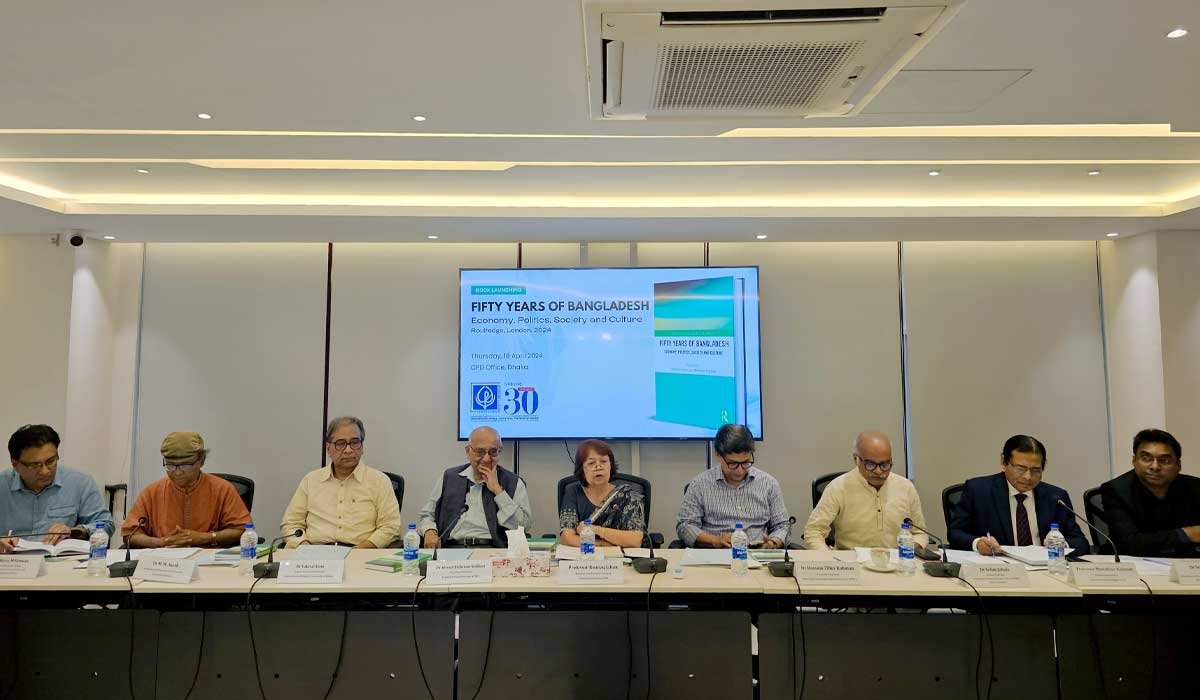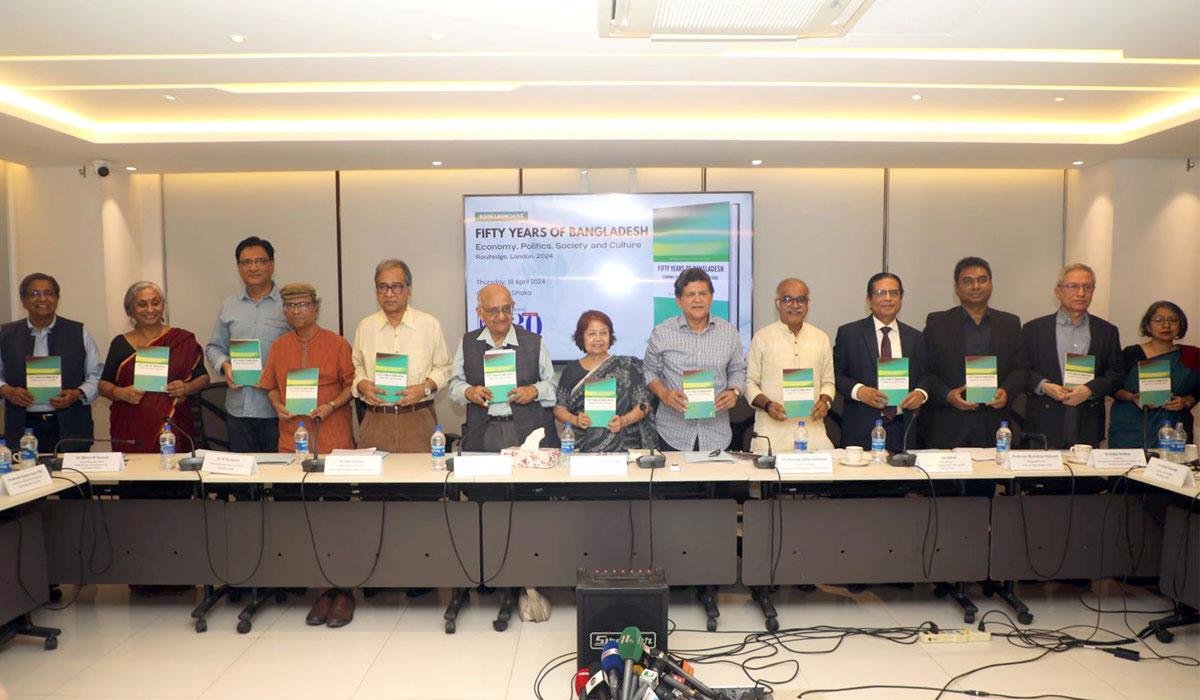
The Centre for Policy Dialogue (CPD) organised a launching programme for the book titled “Fifty Years of Bangladesh: Economy, Politics, Society and Culture”, on Thursday, 18 April 2024. The volume has been published by Routledge and co-edited by Professor Rehman Sobhan, Founding Chairman, CPD and Professor Rounaq Jahan, Distinguished Fellow, CPD.
The book portrays the multi-faceted dimensions of Bangladesh’s development journey, its economic and social transformation and political and cultural contestations. It presents new empirical data supplemented with critical analysis of processes, actors and actions that have been the drivers of Bangladesh’s transformation and offers new ways of understanding Bangladesh. This book should be viewed as a successor publication to a similar volume prepared on the occasion of Bangladesh’s 25th anniversary, ‘Bangladesh: Promise and Performance’ edited by Professor Rounaq Jahan, and published by Zed Books, London.
The impetus for this book arose from the increasing global interest in Bangladesh studies across academic institutions, international agencies, and media outlets. This interest, a relatively recent phenomenon, contrasts with earlier decades when Bangladesh’s post-independence struggles received little scholarly attention beyond its borders. However, the country’s remarkable transformation has captured international attention in recent years.
Recognising the need for a multidisciplinary narrative encompassing political, economic, social, and cultural dimensions, an international conference titled “Fifty years of Bangladesh: Retrospect and Prospect” was convened by CPD in December 2021. Co-sponsored by Cornell University’s South Asia Program, the conference brought together leading scholars from various disciplines, resulting in the presentation of twenty papers, later revised and updated for this volume.
The book explores the interconnectedness of Bangladesh’s economic, political, social, and cultural developments, emphasising that changes in one sector cannot be understood in isolation. Drawing on new empirical data and critical analysis, the authors delved into the drivers of Bangladesh’s transformation.
In her welcome remarks, Professor Rounaq Jahan, remarked, ‘The book serves as a standard text for college and university courses on South Asia and Bangladesh studies, providing updated information and insights for researchers in think tanks and international agencies working on Bangladesh-related issues’. She also noted that the book’s most significant impact may lie in its potential to foster a deeper understanding of Bangladesh’s history and development among the younger generation of Bangladeshis.
The book has been divided into 16 chapters featuring six themes. It begins with an introductory chapter outlining the transformations, contestations, and challenges in Bangladesh. Subsequently, it elaborately explores various themes related to the development and history of Bangladesh, including economic transformation, costs and challenges of development, social transition, cultural contestations, and the challenges ahead.

The authors of the book were present at the book launching and shared their valuable insights.
Commenting on his chapter from the book, Dr Syed Akhtar Mahmood, Former Lead Private Sector Specialist, World Bank Group, said ‘Many observers often describe Bangladesh’s growth experience as a paradox or even a miracle. However, it is neither. Rather, it is the result of an entrepreneurial spirit and the creation of a conducive environment for unleashing this spirit’.
Professor Mustafizur Rahman, Distinguished Fellow, CPD, delved into the strategies necessary for Bangladesh as it navigates the dual graduation of Least Developed Countries (LDC) status and middle-income status, along with the challenges that accompany this transition. He emphasised ‘Deeper regional integration of the Bangladesh economy should be viewed as a crucial opportunity to mitigate the impacts of preference erosion and the loss of LDC-specific international support measures’.
‘There are four generic institutional features in Bangladesh — the supremacy of the ‘deals environment’ over coordinated industrial policy, the supremacy of ‘pockets’ of functional informal institutions over weak formal institutions, the challenges of effective regulation, and the challenges of state capacity’ underscored the Executive Director of South Asian Network on Economic Modeling (SANEM), Dr Selim Raihan. He said that it is imperative to understand the causal connections that link economic and social outcomes to these institutional features.
Dr M. M. Akash, Formerly with Department of Economics, University of Dhaka, commented ‘Unless carefully designed redistributive measures are implemented across various dimensions of inequity and inequality to ensure inclusive growth, Bangladesh risks falling into a middle-income trap. This trap could impede its progress in economic and social spheres, potentially leading to political instability in the future.’
‘The economy of Bangladesh was able to reap growth dividend by utilising surplus labour available in the country, but this dividend came at a cost which was borne by labour itself in the form of low wages, precarious level of living, poor working conditions and denial of the basic rights of workers’ highlighted Mr Rizwanul Islam, former Special Adviser, Employment Sector, International Labour Organisation, Geneva.
Dr Iftekhar Iqbal, Professor at Universiti Brunei Darussalam, highlighted, ‘Bangladesh’s current economic growth is not unexpected, given the region’s historical trend of growth over the past seven centuries. The critical question is whether Bangladesh can maintain this growth trajectory and reach its historic zenith by 2041, the year designated for its transition to ‘developed’ status.”
Dr Hossain Zillur Rahman, Executive Chairman, Power and Participation Research Centre (PPRC), discussed about his chapter and commented ‘Progress in economic development, has not been mirrored in progress in political development. At Independence, politics had seemed the lesser challenge. In a twist of irony, today it is deficits in political development that are gnawing at the foundational dream of an inclusive, humane society’.
Dr Zahid Hussain, Former Lead Economist, World Bank, Dhaka, reviewed various chapters under the themes — economic transformation, costs and challenges of development and the challenges ahead, and said ‘Bangladesh has endured numerous challenges, including war, post-war chaos, natural disasters, famines, and widespread disillusionment. Despite these adversities, there have been notable transformations, such as an increase in per capita income and a decrease in poverty incidence. Human development indicators have improved, and there have been significant shifts in business and production structures’.
While discussing his chapter on evolution of state-society relations, Dr Mirza M Hassan, Senior Research Fellow, BRAC Institute of Governance and Development (BIGD), reflected ‘The defining feature of state-society relations in Bangladesh has been that these tend to be predominantly structured by the political order and somewhat less by the economic order and marginally by the social order’.
‘There is a long tradition of Islamist politics in the country and that Islamism as an ideology has gained traction as a bottom-up process as well’ said Dr Ali Riaz, Distinguished Professor, Illinois State University.
Mr Matiur Rahman, Editor, The Daily Prothom Alo, reviewed the chapters under the cultural contestations theme and emphasised ‘Businesses have expanded over the past decade, but respected entrepreneurs have become less inclined to take risks. In the business sector, particularly in non-governmental banks and the garment industry, the situation is more apparent. Looking ahead, garment owners have benefited disproportionately, leading to the exploitation of workers and the potential destruction of many factories’.
Dr Selim Jahan, Former Director, Human Development Report Office (HDRO), UNDP, New York, reflected on the overall human development landscape of Bangladesh from a historical perspective over the past 50 years and said ‘Even after fifty years, human development challenges remain for Bangladesh. Some of these challenges are lingering challenges, like poverty, gender inequality; some are deepening challenges, like inequalities, climate change; and some are, undoubtedly, emerging challenges, like human security and Coronavirus Disease (COVID-19) pandemic. The global scenario would also give rise to some human development challenges for Bangladesh’.
Dr Sohela Nazneen, Senior Fellow, Institute of Development Studies (IDS) discussed about her chapter on ‘Contentious empowerment? Women, development and change in Bangladesh’ and underscored ‘Despite advancements, restrictive social norms still limit women’s mobility, sexual autonomy, and presence as a collective group’.
Dr Fakrul Alam, Supernumerary Professor, Department of English, University of Dhaka, authored the chapter ‘Shahbagh, Shapla Chottor and Bangladesh’s meandering, contending mindscapes’. In his remarks, he said ‘The culture of tolerating and not forbidding dissent, that is the hallmark of a democratic society, seems to be increasingly threatened’.
Professor Firdous Azim, PhD, Chairperson, Department of English and Humanities, BRAC University, shared her review of the chapters under the social transitions theme and discussed various aspects of women’s empowerment and challenges they face, particularly in Bangladesh. She mentioned the significance of historical events like the Liberation War of 1971 and reflected on how violence against women persists as a critical issue. She emphasised the need to address such violence and empower women not only in specific moments but throughout their lives and across society.
Ms Mahrukh Mohiuddin, Managing Director, The University Press Limited (UPL), discussed the process of the preparation of the book and said that attempts will be made to make the book more affordable for students and for wider dissemination.
In his concluding remarks, the co-editor, Professor Rehman Sobhan commented ‘There’s recognition of economic progress over the past decades, with improvements in various sectors like industry and remittances. However, challenges such as political instability and incomplete democratisation persist’.
The event was followed by open-floor Q&A and discussion. Researchers, academics, authors, literary activists, civil society representatives, and media professionals attended the launching event, some physically, others virtually.


